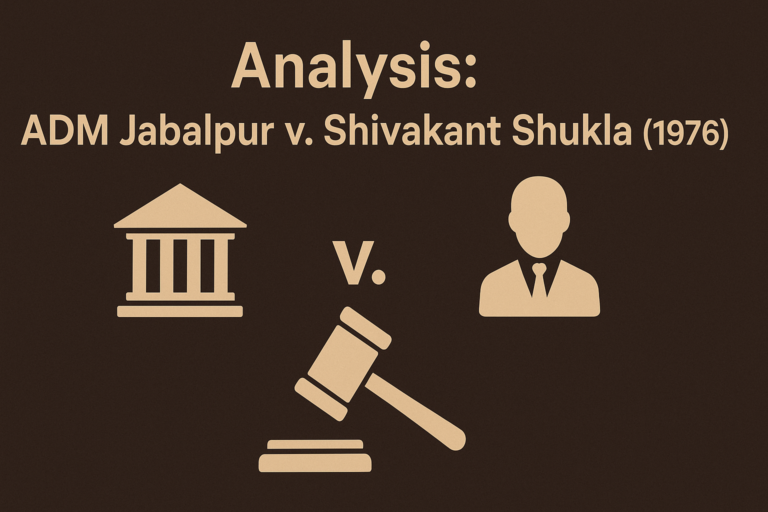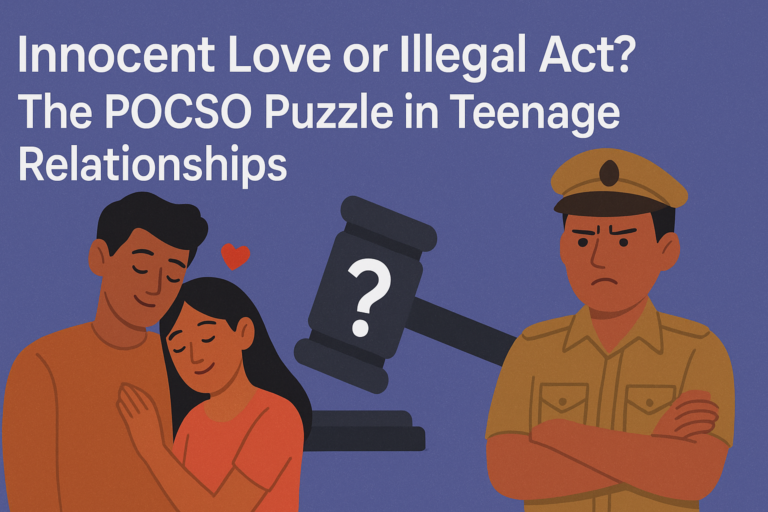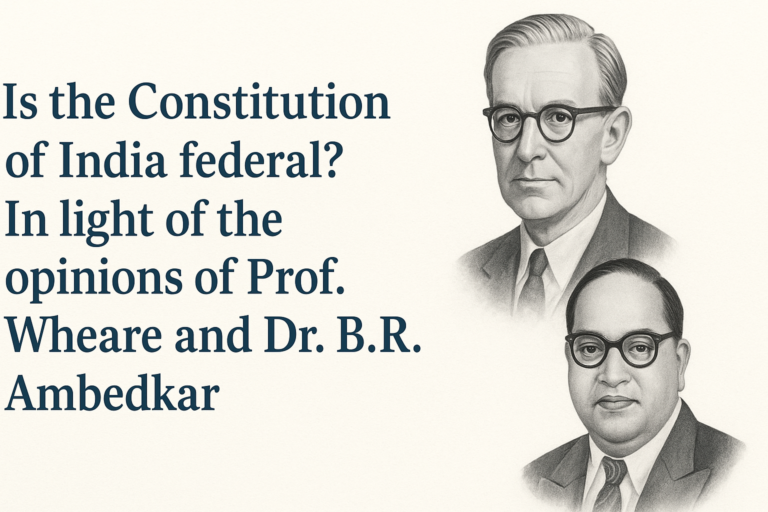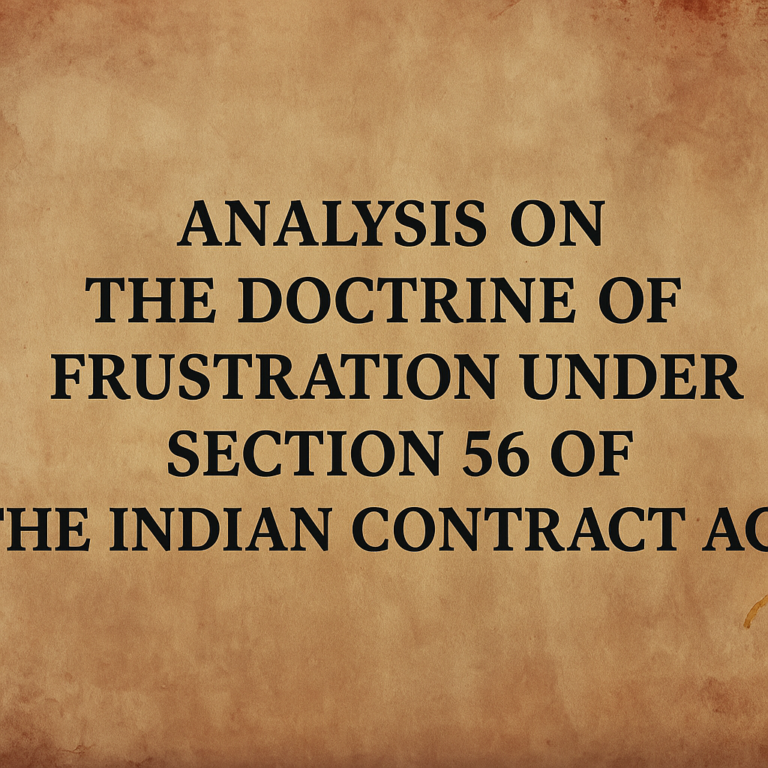
This article has been written by Jatin Rana, currently pursuing B.A.LL.B. (Hons.) from Law College Dehradun, faculty of Uttaranchal University.

Introduction
Right to bail is one of the essential aspects of right to life and personal liberty as enshrined under Article 21 of the Constitution of India, 1950 (hereinafter referred as COI). In the case of Kashmira Singh v. State of Punjab,[1] the hon’ble Supreme Court of India (hereinafter referred as SC) considered the situations wherein people are kept in jail for years and later acquitted in the case. On the basis of the said considerations, the SC held that right to bail of a person is protected under Article 21 of the COI and it can only be refused in accordance with the procedure established by law. Recently in the case of Jalaluddin Khan v. Union of India,[2] the hon’ble SC held that the bail is a rule and jail is an exception and balanced the right to personal liberty and criminal liability of the offender. Presently, the provisions for bail and bonds are covered under the Chapter XXXV of the Bharatiya Nagarik Suraksha Sanhita, 2023 (hereinafter referred as BNSS). The said chapter covers the different aspects of bail like bail in bailable offences, bail in non-bailable offences, bail to undertrials etc.
Meaning of Bail
The term ‘bail’ is derived from the French word ‘baillier’ which means ‘to give away or deliver’. Bail is also defined as “the setting free of the defendant by releasing him from the custody of law and entrusting him to the custody of his sureties who are liable to produce him to appear for his trial at a specific date and time.”[3]
According to Section 2(b) of the BNSS, the term means “release of a person accused of or suspected of commission of an offence from the custody of law upon certain conditions imposed by an officer or court on execution by such person of a bond or bail bond.”
The discussed definition introduces two essential components i.e., bail bond and bond. The term ‘bail bond’ means an undertaking with sureties for the release of an accused from the custody while the term ‘bond’ a personal undertaking or bond without sureties for the release of an accused from the custody.[4]
Authority to grant bail
One of the essential aspects of the bail under the BNSS is that who has the authority to grant bail under the law. To understand the above said aspect, it is important to understand the categorization of the offences which is wholly done on the basis of the bail i.e., bailable offence and non-bailable offence. According to section 2(c) of the BNSS, “the bailable offence means an offence which is shown as bailable in the First Schedule, or which is made bailable by any other law for the time being in force and non-bailable means any other offence”. In bailable offences, the authority granting bail has limited discretion to which the right to bail of an accused is subjected while in non-bailable offences, the authority is wide discretionary powers.
Under BNSS, there are two authorities which can legally grant bail to the accused persons. In cases of bailable offence, the officer in charge of a police station and the Court have the power with limited discretion to grant bail to the accused person, while in the cases of non-bailable offence, the Court has more power and discretion than the police officer. According to section 480(2) of the BNSS, the court or the police officer may release the accused on the execution of the bail bond or bond, if there are no reasonable grounds to believe that the accused person has committed any non-bailable offence. Thus, it can be concluded that both the officer in charge of a police station and the court have the power to grant bail. Also, according to Section 47 of the BNSS, it is the duty of the police officer to inform the person regarding his right to bail, if he is arrested without warrant for any bailable offence.
Types of Bail
- Regular Bail
Regular bail means a bail granted by an officer in charge of police station or by the Court in the ordinary course and according to the legal mechanism. According to the BNSS, regular bail can be studied under three heads i.e., bail in bailable offences, bail in non-bailable offences and bail to undertrials.
- Bail in bailable offence
In the cases of bailable offences, it is the fundamental right of the accused person to get bail. This head of the regular bail is covered under section 478 of the BNSS. According to the said section, the officer in charge of a police station or Court have limited discretion and shall release the person arrested without warrant for any bailable offence, on the execution of a bail bond or a bond.
If the person fails to bring surety within the week of his arrest, he will be considered as an indigent person and will be allowed to execute bond instead of the bail bond. The said section also gives the power to refuse bail on the further occasion of his arrest or appearance in the court due to violation of the conditions of bond or bail bond.
- Bail in non-bailable offence
Bail in non-bailable offence is covered under section 480 of the BNSS. The said section covers both the positive aspect and the negative aspect. It states that every person to be released on bail and also lays down the exceptions under which a person accused of non-bailable offences cannot be released on bail by a Court other than the Session court or the High court. The exceptions are as follows:
- If there are reasonable grounds to believe that the person has committed an offence punishable with imprisonment with life or death.
- If the person is accused of cognizable offence and has also been convicted for an offence punishable with death penalty or imprisonment for life or for seven years or more, or has been convicted twice or more for offence punishable with imprisonment for three years or more but less than seven years. Here, the court has the discretionary power to grant bail to the accused if the court founds it just for special reasons.
The section has also provided the exception for the above exceptions which is that the court has discretionary power to grant bail if the accused is a woman, child, sick or infirm. The court or the police officer may release the accused on the execution of the bail bond or bond, if there are no reasonable grounds to believe that the accused person has committed any non-bailable offence.
The section also covers the imposition of conditions while granting bail to the person accused of offences affecting the human body[5] or of offences against the state[6] or of offences against property[7] or of abetment of the said offences.
There are also certain special conditions under which the court may grant bail to the accused person. Firstly, if the trial is not concluded within sixty days from the first date fixed for taking evidence and secondly, when the court before passing a judgement believes that the accused person is not guilty of the offence, may grant bail to the accused person.
- Bail to undertrial prisoners
The BNSS has also laid down the maximum period for which the undertrial prisoners can be detained. Section 479 of the BNSS covers the provisions for the bail to the undertrial prisoners, subjected to time period for which they have been detained. According to the said section, if the person is not accused of an offence punishable with death or life imprisonment as one of its punishments, he shall be released on bail if he has been detained for 1/2nd of the maximum punishment or 1/3rd of the maximum punishment if he is a first-time offender. Also, the court shall consider the arguments of the public prosecutor before granting bail under the section.
If there are multiple criminal cases pending against the accused, the court shall not grant bail to the accused but the court shall always consider that no person can be detained for the time period exceeding the maximum punishment given for the offences.
In the case of Re-Inhuman Conditions In 1382 Prisons v. Director General of Prisons and Correctional Services and Ors.,[8] the hon’ble SC dealt with the question that whether section 479 of the BNSS applies prospectively or retrospectively. Considering the over-crowding of prisons in India, the court held that the said section shall be applied retrospectively in order to ease the bail criteria for the first time offenders.
- Post conviction bail
The person who has been convicted for the offence can also seek bail under the BNSS. According to section 481 of the BNNS, in case of appeal filed against the judgment, the trial court or the appellate court may grant bail to the accused person by way of execution of bond or bail bond to appear before the higher court and such bond shall be valid for only six months.
In the case of Somesh Chaurasia v. State of M.P. and Another,[9] the hon’ble SC gave an important judgement within the ambit of the post-conviction bail. In the said case, the SC held that in post-conviction bail the courts should adopt more stringent process and shall provide opportunity to the public prosecutor to argue while granting post-conviction bail. The court also held that in cases of murder, such bail should only be given in exceptional circumstances and commission of additional crimes will lead to the dismissal of bail and arrest.
- Anticipatory Bail
Anticipatory bail is given to the person who is apprehending arrest and can only be granted by the Session court or the High court. According to section 482 of the BNSS, if any person believes that he may be arrested for any non-bailable offence, he may apply to the High court or the Session court to direct for his release on bail on event of his arrest, subjected to the conditions as imposed by the respective court while considering the facts of the case. Under this section the respective courts have discretionary powers while granting bail to the person apprehending arrest. In the case of N.S. Sahni v. Union of India,[10] the hon’ble SC held that the court has the discretionary powers in the matter of anticipatory bail and it is not an essential part of right to life enshrined under Article 21 of the COI.
If the person is accused of rape of a woman under sixteen years or twelve years of age[11] or gang rape of a woman under eighteen years of age,[12] neither the Session court nor the High court shall grant anticipatory bail to accused under section 482 of the BNSS.
In the case of Pratibha Manchanda v. The State of Haryana,[13] the hon’ble SC held that the High Court and the Court of Session while dealing with applications for anticipatory bail, should consider the nature and gravity of the alleged offence and its impact on the society.
- Interim Bail
There is no statutory provision under the BNSS for granting interim bail. The concept of interim bail is wholly an outcome of judicial pronouncements. When the proceedings of the regular bail or anticipatory bail are not concluded, the court may grant temporary bail for the time period until the said proceedings are concluded. In the case of Mohammed Zubair vs State of NCT of Delhi,[14] the SC of India granted interim bail to the accused and also imposed certain conditions with it. In the case of Arvind Kejriwal v. Directorate of Enforcement,[15] the hon’ble SC granted interim bail to then Chief Minister of Delhi in order to provide him the liberty to campaign the Lok Sabha elections of 2024.
- Default Bail
The default bail is covered under section 187(3) of the BNSS. The said section states that if the investigation is not completed within ninety days, if the offence is punishable with death or imprisonment for life or ten years or more, or sixty days, if any other offence and the accused person has been in custody for the said time period, the person shall be released on bail and shall be deemed to be released under the provisions of XXXV of the BNSS. In the case of Ritu Chhabaria v. Union of India,[16] the hon’ble SC held that if the prosecution files an incomplete chargsheet, the accused person will still have the right to seek default bail under the given statutory provisions. Also, as held in the case of State through CBI v. T. Gangi Reddy @ Yerra Gnagi Reddy,[17] the court may cancel the default bail if the lately filed chargesheet discloses commission of any serious non-bailable offence by the accused.
Special powers of High Court and Session Court
Under Section 483 of the BNSS, the High Court and the Session Court have special powers in the matter of bail. Under the said section, the mentioned courts have power,
- To impose any condition if the person is accused of offences affecting the human body or of offences against the state or of offences against property or of abetment of the said offences.
- To set aside or modify any condition imposed by the magistrate while granting bail.
- To notify the public prosecutor regarding the bail application and to seek presence of the informant while hearing bail application for the offence under section 65 and 70(2) of the Bharatiya Nyaya Sanhita, 2023.
- To direct the arrest of any person released on bail.
Conclusion
The right to bail is the fundamental right of every person but it is subjected to the procedure established by law. Every provision of bail under the BNSS starts with positive aspect which is that every person to be released on bail but it also provides exceptions to it. In the case of Umarmia v. State of Gujarat,[18] the hon’ble SC considered the issue of delay in concluding bail applications and suggested that the courts should fix the timing for concluding bail applications and held that the Subordinate courts may dispose bail applications within one week and High court may dispose bail application within two-three weeks. Also, in the case of Jalaluddin Khan v. Union of India,[19] the hon’ble SC held that the bail is a rule and jail is an exception and balanced the right to personal liberty and criminal liability of the offender.
[1] Kashmira Singh v. State of Punjab, AIR 1977 SC 2147.
[2] Jalaluddin Khan v. Union of India, Criminal Appeal No. 3173 of 2024.
[3] Wharton’s Lexicon and Stroud’s Judicial Dictionary.
[4] The Bharatiya Nagarik Suraksha Sanhita, 2023, Section 2(d) and 2(e).
[5] The Bharatiya Nyaya Sanhita, 2023, Chapter VI.
[6] The Bharatiya Nyaya Sanhita, 2023, Chapter VII.
[7] The Bharatiya Nyaya Sanhita, 2023, Chapter XVII.
[8] Re-Inhuman Conditions In 1382 Prisons v. Director General of Prisons and Correctional Services and Ors., WRIT PETITION (CIVIL) NO.406/2013.
[9] Somesh Chaurasia v. State Of M.P. and Another (2021 INSC 349).
[10] N.S. Sahni v. Union of India, AIR 2001 SC 3810.
[11] The Bharatiya Nyaya Sanhita, 2023, Section 65.
[12] The Bharatiya Nyaya Sanhita, 2023, Section 70(2).
[13] Pratibha Manchanda vs The State Of Haryana, CRIMINAL APPEAL NO 1793 OF 2023.
[14] Mohammed Zubair vs State Of Nct Of Delhi, Writ Petition (Criminal) No 279 of 2022.
[15] Arvind Kejriwal v. Directorate of Enforcement, W.P.(CRL) 985/2024 & CRL.M.A. 9427/2024.
[16] Ritu Chhabaria v. Union of India, WRIT PETITION (CRIMINAL) NO. 60 OF 2023.
[17] State through CBI v. T. Gangi Reddy @ Yerra Gnagi Reddy, Petition(s) for Special Leave to Appeal (Crl.) No(s). 9573/2022.
[18] Umarmia v. State of Gujarat, (2017) 3 SCALE 460.
[19] Supra note 2.






